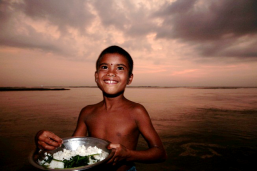Bangladesh as one of the best models to reduce hunger: CLP’s contribution in the chars
 Over the last few decades, Bangladesh has been one of the best performing nations in the world to fight hunger and achieve food security for its vast population. Recognised by national and international scholars, Bangladesh stands out as one of the three top countries in the world for reducing hunger (click here to see more). CLP has played a significant role. Reducing hunger and promoting food security is one of the Programme’s core objectives.
Over the last few decades, Bangladesh has been one of the best performing nations in the world to fight hunger and achieve food security for its vast population. Recognised by national and international scholars, Bangladesh stands out as one of the three top countries in the world for reducing hunger (click here to see more). CLP has played a significant role. Reducing hunger and promoting food security is one of the Programme’s core objectives.
The CLP’s multi-sectoral approach provides a wide-ranging package of support, ranging from direct transfers of assets, stipends and infrastructure, to a comprehensive curriculum of training, capacity-building and other institutional support. This holistic approach to reducing extreme poverty in the riverine islands of north-west Bangladesh allows participants increased access to food, higher availability of food in the chars and efficient utilisation of food to gain proper nutrition.
 The cornerstone of CLP, the asset transfer project, boosts people’s livelihoods and incomes, allowing them to purchase more and better food. With input and knowledge support in setting up and running homestead gardens in every participants’
The cornerstone of CLP, the asset transfer project, boosts people’s livelihoods and incomes, allowing them to purchase more and better food. With input and knowledge support in setting up and running homestead gardens in every participants’  backyard, CLP participants can produce food to consume at home or to sell in the market, if there is a surplus. This makes more food available in the chars. And finally, by ensuring an improved water source and sanitation along with training on hygiene practices, people can absorb the maximum amount of nutrition from the food they eat. CLP’s approach works: when participants begin receiving assistance, less than a third report being able to eat three meals a day. By the end of CLP’s assistance, usually 18-20 months later, almost every participant household can. Far greater numbers than before report also eating five or more food groups over the last 7 days.
backyard, CLP participants can produce food to consume at home or to sell in the market, if there is a surplus. This makes more food available in the chars. And finally, by ensuring an improved water source and sanitation along with training on hygiene practices, people can absorb the maximum amount of nutrition from the food they eat. CLP’s approach works: when participants begin receiving assistance, less than a third report being able to eat three meals a day. By the end of CLP’s assistance, usually 18-20 months later, almost every participant household can. Far greater numbers than before report also eating five or more food groups over the last 7 days.
A recent paper by CLP (click here) provides more details on CLP’s approach and its results. CLP is pleased and proud to be helping the Government and people of Bangladesh to fight food insecurity and hunger, and also proud that these successes are being reflected in global recognition of Bangladesh’s achievements.





 Visit Today : 119
Visit Today : 119 Total Visit : 166244
Total Visit : 166244 Hits Today : 671
Hits Today : 671 Total Hits : 1395582
Total Hits : 1395582 Who's Online : 1
Who's Online : 1